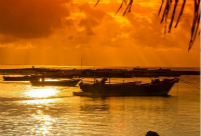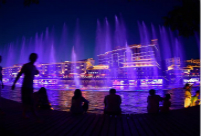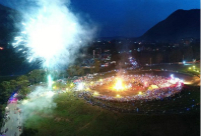

Government of Japan's Okinawa prefecture on Monday filed a fresh lawsuit against the central government on the renewal of a permit to allow construction work for the relocation of a controversial U.S. Marine base.
The latest lawsuit is aimed at halting the central government's ongoing plans to relocate the U.S. Marine Corps Air Station Futenma in Ginowan to the less populated Henoko coastal region of Nago, which is also on Okinawa island.
The lawsuit argues that the central government has not secured permission from Okinawa Governor Takeshi Onaga for construction work that will damage rocks on the sea bed where reclamation work has been going on.
The prefectural government has also filed an injunction prohibiting the construction work, ahead of the court's ruling on the issue.
The Okinawa government also believes that fishing rights have been granted in the Henoko region, meaning the central government's construction work is infringing on these too.
The prefectural government has requested the central government to renew its permit to work in the area, which expired in March, although the central government maintains that it does not need permission as legal matters concerning fishing rights have already been dealt with.
Authorities in Okinawa opposed to the construction work fear that sediment to be poured inside the seawalls being constructed for the replacement facility in Oura Bay will be extremely detrimental to the environment.
They have stated that the reclamation work runs contrary to the National Biodiversity Strategy of Japan, as it is damaging an ecosystem unique to Okinawa.
Environmentalists have also voiced concerns about the materials used for the reclamation work introducing invasive species to the region.
Experts, having surveyed the coral reef at the bottom of the ocean near the tip of one of the seawalls, have also concluded that the Porities lutea coral, which is part of the reef and just 20 meters away from the tip of the seawall, has a high likelihood of being destroyed by rocks thrown into the ocean due to the construction.
The waters of Oura Bay are also the last home of the endangered Japanese dugong, which is a large marine mammal and cousin of the manatee. Environmentalists are certain of the species' extinction if the central government's construction continues.
The return of the land to Okinawa used for the Futenma base was agreed in 1996 between the United States and Japan and in 2006 both sides inked a deal, part of which included transferring the airfield to the Henoko region on the island.
Amid staunch opposition from local officials and residents of Okinawa who bear the burden of hosting the majority of U.S. military facilities in Japan, and as anti-U.S. sentiment rises on the tiny island in the wake of a number of heinous crimes committed by U.S. base-linked personnel, the central government maintains that shifting the base to Henoko remains "the only solution."
 Beautiful scenery of Sansha city in South China Sea
Beautiful scenery of Sansha city in South China Sea Night view along Fengyu bridge in China's Hubei
Night view along Fengyu bridge in China's Hubei Shanghai Zoo takes varied measures to keep animals cool
Shanghai Zoo takes varied measures to keep animals cool China becomes world’s top buyer of Australian gold
China becomes world’s top buyer of Australian gold Beauty of the sea in the eyes of Chinese sailors
Beauty of the sea in the eyes of Chinese sailors Didi Chuxing to co-lead in $2billion investment to SEA’s largest ride-hailing platform
Didi Chuxing to co-lead in $2billion investment to SEA’s largest ride-hailing platform Torch festival lights up night sky in Sichuan
Torch festival lights up night sky in Sichuan World’s first shared bookstore opens in Anhui to promote reading
World’s first shared bookstore opens in Anhui to promote reading China’s domestic airlines' carrying capacity beats the US
China’s domestic airlines' carrying capacity beats the US Top 10 most sustainable cities in China
Top 10 most sustainable cities in China Top 10 European patent applicants in 2016
Top 10 European patent applicants in 2016 The power of 'She' in China
The power of 'She' in China Seven most beautiful art museums in China
Seven most beautiful art museums in China American media bigoted on Sino-US trade ties
American media bigoted on Sino-US trade ties China’s online media purification drive is changing millenials’ lifestyle
China’s online media purification drive is changing millenials’ lifestyle ‘World’s factory’ adapts to new era, setting example
‘World’s factory’ adapts to new era, setting example Attracted to the dark
Attracted to the darkDay|Week